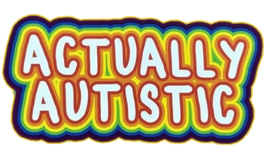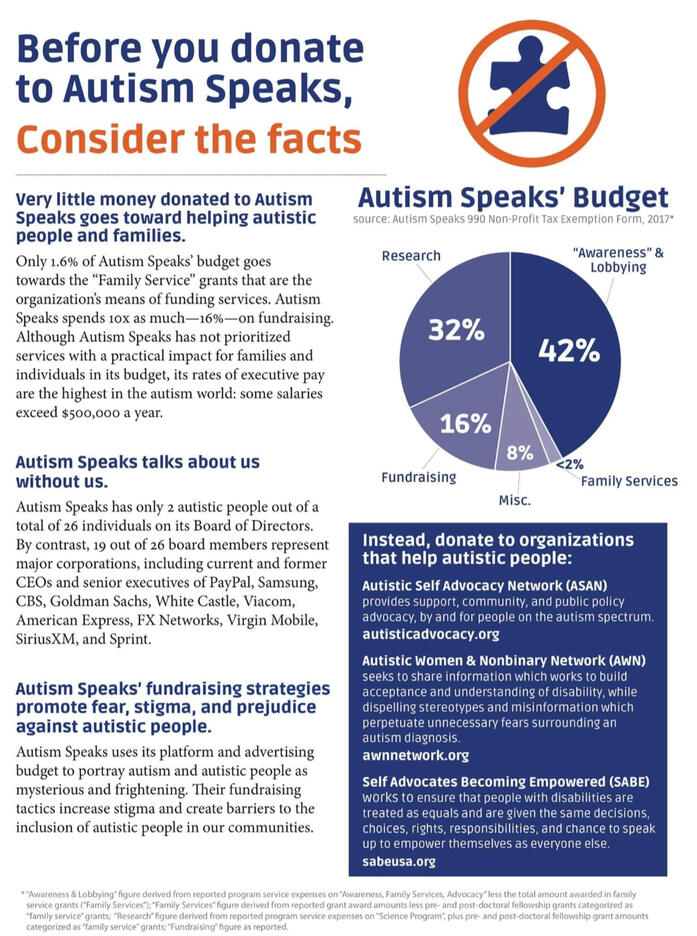
the purpose of this carrd is to educate people as there are many myths and misconceptions about autism
what is autism?
Autism is a developmental disability that is characterized by difficulty in social interaction and communication and by restricted or repetitive patterns of thought and behaviour.
what are the signs of autism?
click on highlighted texts
for more information on them
Finding it hard to understand what others are thinking or feeling
Repetitive behaviors like hand-flapping, rocking, jumping, or twirling
Taking things very literally – for example, having difficulty understanding sarcasm or metaphors
Over or under sensitivity to sounds, smells, touch,taste, light, colours and temperatures
Having the same routine every day and getting very anxious if it changes
Not understanding social "rules", such as not talking over people
Intense and highly-focused interests, often from a fairly young age
Avoiding eye contact
Seeming rude, blunt or not interested in others without meaning to
stimming is a repetitive body movement that self-stimulates one or more senses in a regulated manner.
some common forms of stimming among autistic people include hand flapping, body spinning or rocking, lining up or spinning toys or other objects and echolalia (repeating sounds, words or phrases).
most autistic people stim, but some don't.
stimming is very important for a number of reasons. it can help autistic people to relax and can act as a soothing behaviour. it can also be a way to express feelings and communicate.
stimming is a natural behavior that can improve emotional regulation and prevent meltdowns in stressful situations.
autistic people often have an intense and passionate level of focus on things of interest. these "special interests" are extremely important and meaningful to the autistic person
sometimes these interests are lifelong; in other cases, one is phased out to make room for another. in pursuit of these interests, autistic people often manifest extremely sophisticated reasoning, an intense focus, and a remarkably good memory for trivial facts.
autistic people display remarkable focus and dedication when interacting with their special interests. they often are able to research it and talk about it at length without getting bored. they may have little interest in things outside their special interests
special interests come in many forms. anything can be a special interest including animals, technology, science, music, books, tv and films.
special interests are important as they provide a source of recreation, allow the autistic person to become knowledgable in a certain area, provide a safe haven during times of stress which assists in avoiding meltdowns and sensory overloads, and improve self esteem.
sensory issues are very common for autistic people. individuals vary in their responses to sensation -- some may be hypersensitive (over-sensitive) to some things, and hyposensitive (under-sensitive) to others.
sensory overloads occur when an individual gets overwhelmed with sensory stimulation. sensory overloads are extremely stressful and often painful.
hypersensitive individuals will generally go to great lengths to avoid certain types of sensory stimulation. it is advisable for people with hypersensitivity problems to try and find items that will help them cope, and avoid having a sensory overload.
items such as gloves, ear defenders, certain fabrics, sunglasses, hoods, hats etc may help to prevent sensory overloads. stimming can also assist in preventing sensory overloads.
hyposensitivity is essentially the exact oposite of hypersensitivity - hyposensitive individuals are under-sensitive to certain types of sensory information. hyposensitive people often go 'sensory seeking', where they try and seek out certain sensory inputs.
AUTISM MYTHS
autistic people cannot feel love and they do not care about other people = this is false. autistic people can and do feel love and they do care about other people. they may just express it differently. an autistic person not expressing love and affection in ways that most people are expected does not mean they do not care. they may find expressing their feelings difficult, or they may be uncomfortable with physical affection such as hugging. this does not mean they do not care
autism is a mental illness or a disease = this is false. autism is a developmental disability, not an illness or a disease. mental illnesses develop, and although can be passed through genetics, are not present from birth, unlike autism.
autism is not a disease either, because it is not contagious and cannot be "caught". autism is not a sickness or illness. it is not a bad thing and it cannot be cured.
don't say autistic, say with autism/suffering with autism/living with autism = this is false and extremely harmful.
contrary to popular belief, autistic (identity-first language) is mostly preferred by autistic people and with autism/suffering from autism/living with autism (person-first language) is considered harmful and the majority of the autistic community are against it.
this is because saying autistic people have autism or live with autism implies that autism is extractable from the autistic individual, which is false. autism impacts autistic people every moment of their entire lives. autism never goes away, autistic people are autistic from the moment they are born until the moment they die. it impacts autistic people's life experiences and personalities. it isn't something they have it's something they ARE.
saying autistic people "suffer" from autism is also harmful. this is because autism is not a bad thing. it just means the individual experiences the world differently. autistic people do not suffer from autism, autistic people suffer from ableism from other people because of their autism. autism isn't the problem, ableism is.
autism can be cured = this is false. autism is life-long and cannot be cured. the idea of a "cure" for autism is inherently ableist as it implies that autism needs to be cured, which it doesn't. autism impacts autistic people's personalities and life experiences, and by saying they should be "cured" is saying that you do not care about them as people and that they only matter when they act "normal". therapies such as ABA are not cures for autism, and do not help autistic people in any way. therapies such as ABA are abuse and focus on forcing the person to hide their autistic traits for the convenience of the people around them.
only boys can be autistic = this is false. boys are more commonly diagnosed, but that doesn't mean girls cannot be autistic. AFAB (people are less commonly diagnosed because their autistic traits often present differently. they may have more "normal" special interests such as tv shows or music and they often learn to mask and hide their autistic traits as children. professionals often cannot spot autism in AFAB people because most studies of autism have focused on AMAB people
everyone's a little bit autistic = this is false. autism is a developmental disability. autistic people experience the world differently to non-autistic people and by saying that everyone is a little bit autistic, you are ignoring that they are autistic and have had different experiences that most people have not experienced.
identity-first language is widely preferred within the autistic community. when referring to an autistic person or the autistic community, you should always use identity-first language. however, this does not apply if you are aware that an autistic person does not like identity-first language and prefers person-first language. if an autistic person prefers to be called a person with autism, you should refer to them as such.
autistic people look a certain way = this is false. you cannot tell if someone is autistic by looking at them. autistic people can look any way. by saying autistic people have to look a certain way, you are replying on and encouraging stereotypes.
only children can be autistic/autism goes away when an autistic child gets older this is = false. autism is life-long, it never goes away. autistic children become autistic adults.
self diagnosing autism is wrong = this is false. self diagnosing autism is valid. many autistic people are unable to get diagnosed for a variety of reasons.
it may be too expensive and their family may not allow them to. it can also be extremely difficult for people of colour, AFAB people, trans people and mentally ill people to get a diagnosis as many professionals are ignorant and think that all autistic people are the same or that only cisgender, heterosexual white boys can be autistic, which is extremely wrong and ableist.
self diagnosing allows people to find resources and information that can help them. it also allows them to find other people they can relate to and gives them sense of community and belonging. self diagnosed autism is valid as long as a lot of research is done.
functioning labels should be used = this is false. "high" and "low" functioning are harmful labels that enforce negative ideas and stereotypes about autistic people. it separates the autistic community into two inaccurate boxes.
"high-functioning" people are considered "mildly autistic" which means that their struggles are ignored and they may not be able to get the extra support or assistance they need.
"low-functioning" autistic people are infantilised and are often seen by society as worthless and incapable of doing anything.
functioning labels are harmful and ableist and inaccurate. this is because many autistics may be able to "function" well in some situations but may not be able to "function" well in others. functioning labels are not about the autistic-person's needs, but instead are about how well the autistic person can mask their autistic traits and how "normal" they can seem.
RESOURCES
(more resources to be added soon)
autism speaks is NOT a reliable source. do not go to autism speaks for information about autism. they are an ableist hate group that promotes extremely harmful ideas. click here for more information on why you should not support them
AUTISM-RELATED TERMINOLOGY
neurodivergent - a person who has adhd, add, dyspraxia, dyslexia, dyscalculia, tourette's or is autistic.
sensory overload - when a person gets overwhelmed from sensory stimulation
neurotypical - a person who does not any of the above conditions/disorders
allistic - a person who is not autistic
(page in progress)
